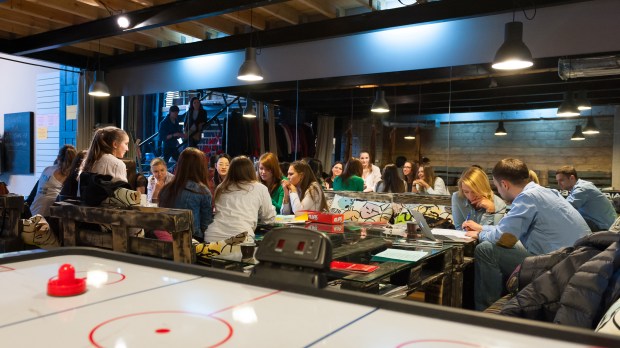Increasingly, people in the West spend the bulk of their day either in front of a computer or constantly looking at their smartphones, and endlessly (often predictably) “reacting” to whatever is before them on Twitter or Facebook. In such a reality “board-game cafés” might seem like an odd new trend. Primarily geared toward adults, these coffee shops and pubs give people the opportunity to play hundreds of board games — such as Monopoly, Ticket to Ride, Battleship, Pandemic or Guess Who — with friends and family, in person and emphatically not online.
Café patrons are invited to learn the rules of a game – most businesses keep a “game master” on hand, whose job it is to both offer game instructions and clarify rules when necessary – and then simply spend some enjoyable time gaming with friends while sharing small plates and enjoying some coffee, tea, wine, or beer.
Surprisingly, these board-game cafés are popular with every demographic and are found across the globe. Ever since Toronto’s Snakes and Lattes opened its doors in 2010, similar places have sprung up in Berlin, Beijing, Galveston, Los Angeles and Brooklyn to name a few. The remarkable success of these analog gaming venues has inspired dozens of Kickstarter campaigns in hopes of bringing this trend to cities around the world.
One such project seeking support is Pawns and Pints, a joint venture started by former schoolteacher Edward Schmalz. Seeking to establish the first board-game café in Kansas City, Schmalz said he was inspired “by a board-game café in Omaha [and] being a big board gamer myself I loved the concept and over the course of the last year I have connected with a variety of people in the KC area who share my passion for games, coffee and craft beer.”
Schmalz believes these board-game cafés are the perfect antidote to the lack of human interaction found in our digital society. “Board games force people to sit, look at the person across the table from them and have an actual conversation. In an age where most of our smart phone usage is bordering on an addiction and person-to-person conversations are rarer and rarer, board games are the anti-drug.”
Many agree with Schmalz, believing that part of the success of board-game cafés can be attributed to a desire for human interaction that the digital world can’t fulfill. Former neuroscientist Jon Freeman, who started his own café called “The Brooklyn Strategist,” explained to The Atlantic, “Adults who spend all day sitting in front of a computer want to spend time with people. It’s really about people having like-minded, shared experiences. We’d lost access to that, and places like board-game cafés have opened up access.”
Aside from providing an alternative to digital communications, board games are also beneficial in promoting healthy social interaction. Mary Flanagan, a Professor of Film and Media Studies at Dartmouth College, said, “Board games structure social interaction in a really safe and helpful way. Face-to-face conversation is getting weirder and weirder. Board games help us get along and communicate.”
While the internet has opened-up many social and commercial horizons, it has also hindered our ability to communicate. As Pope Francis pointed out in his message for the 50th World Communications Day, “Social networks can facilitate relationships and promote the good of society, but they can also lead to further polarization and division between individuals and groups.” Board-game cafés are a healthy reaction to this digital polarization and are helping many people regain the ability to have authentic human interactions.
Cafés are not the only ones reaping the benefits of this new trend, as board game sales have increased by 20 percent in the past few years and sales at hobby stores are skyrocketing. Despite how precarious a current mood of political correctness has made conversation, people still want to communicate with one another and board games – which are mostly apolitical and non-confrontational — appear to be the perfect fit.
If there is a lesson here, perhaps it is that while emails, text messages and Facebook comments have replaced much of our face-to-face interactions, our human souls desire more. Emoticons are simply not enough for most of us. Sometimes we have to engage with other humans, and connect in simple ways. In that case, these board-game cafés are helping to facilitate that basic human need.
[Editor’s Note: Take the Poll – Would You Be a Regular at a Board-Game Cafe?]

